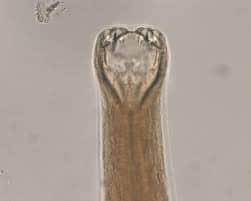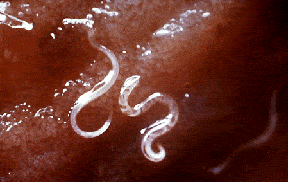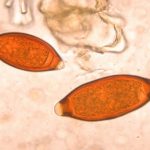
Hookworms are one of the most common internal parasites of puppies and kittens, the others being roundworms, tapeworms, and coccidia. Hookworm infection has several features that are of interest to the caretakers of dogs.
- Hookworms suck blood
- Hookworms can be transmitted to young pups while they are nursing
- Hookworms can infect humans through cuts in the skin
- Hookworms can cause severe disease in young pets
Life Cycle of the Hookworm

The adult hookworm lives in the small intestine of its host where it hangs on to the intestinal wall using its teeth-like structures. This means that, like other parasitic worms, they are bathed in intestinal nutrients but while other worms take the host’s food by absorbing it through their skin, hookworms feed by drinking their host’s blood. The adult worm lives and mates within the host’s intestine and ultimately, the female produces eggs. Hookworm eggs are passed into the world mixed through the host animal’s feces.
The larva can infect its new host in several ways. One way is to penetrate the host’s skin directly through the feet or belly or whatever part of the skin is touching the ground. Another way for the larva to gain entry to the new host is to be licked up and swallowed by the host as it cleans itself. The pet can be infected from contaminated dirt or by eating an infected animal or insect, including a cockroach.The egg hatches in the environment and develops from a first stage larva (the hatchling) to a second stage larva and lastly a third stage larva, which is ready to infect a new host.
Summary: The adult worms live by sucking blood from the intestine. Their eggs are passed by the host into the environment where a new host picks them up. The developing larvae may migrate widely through the new host’s body before settling down to complete their maturation.
Hookworms Suck Blood
Hookworm infection can be especially bad to the young puppy or kitten. These animals are growing, and growth includes making enough new blood to nourish the entire body as well as provide extra oxygen needed to grow, which requires a lot of blood production from the immature animal’s bone marrow, yet in the hookworm-infected puppy this process is being sabotaged by the hookworms. In severe cases, the young puppy or kitten can bleed to death.
Infected puppies and kittens are commonly pale, weak, and have long-standing deficiencies. They may or may not have diarrhea.
Treatment involves deworming with one of several products including: fenbendazole (Panacur®), pyrantel pamoate (Nemex®, Drontal Plus®, or Strongid T®) and others. Some of these products are not absorbed into the host’s body from the GI tract and can only kill worms in the GI tract. These products are typically given every 2-4 weeks to cover worms returning from their migration.
For severely affected young animals that are very anemic, they may require more than just killing the worms. In these cases a blood transfusion may be needed to keep the animal alive until it can replace its own lost red blood cells. An iron supplement is frequently needed as well.
Hookworms are Transmitted to Unborn Pups
Infection of a very young puppy can occur in two ways not addressed above.

Typically an infected mother dog will have encysted larvae all around her body. Throughout the adult dog’s life, some larvae will awaken, break out of their cysts, and complete their migration to the GI tract.
Pregnancy hormones serve as wake-up calls to encysted hookworm larvae and the worms migrate to the unborn puppies through the mammary gland. This means that most puppies will become infected by drinking their mother’s contaminated milk.
If this is not enough to infect the entire litter, others will become infected from the soil of their own nest that will quickly become contaminated with the stool of their infected litter mates.
Because hookworms affect young animals so severely, the Companion Animal Parasite Council has recommended automatically deworming puppies for hookworms beginning at age two weeks and kittens at age three weeks in areas where hookworms are common.
Can We Prevent Transmission from the Mother?
The answer is yes but daily deworming is required through the second half of pregnancy and into the nursing period. A regular single deworming will not be effective in protecting the litter. A specific protocol using fenbendazole (Panacur®) has been found to be effective in preventing both roundworm and hookworm infection in unborn puppies.
Ask your veterinarian about this method if you are contemplating breeding a female dog. Female dogs using Proheart6 (injectable moxidectin) for heartworm prevention are believed to pass fewer hookworm larvae on to their pups.
Human Beings Can Get Hookworms

infection in the skin of a person
Hookworm infection in the skin is intensely itchy but usually treatable. Local restrictions on bringing dogs to beaches and the strict clean-up laws reflect concern for hookworm (and roundworm) infection in people.Contaminated soil is an important hookworm source when it comes to a human disease called “cutaneous larva migrans.” Running barefoot through the park or beach may seem nice but if the soil has infected fecal matter, the infective hookworm larvae can penetrate your skin.
Humans can also become infected by eating improperly washed vegetables that may harbor contaminated soil. Humans have been found with actual hookworm intestinal infection. This would be a challenging diagnosis as it is not usually expected but the good news is that it is treated fairly easily when it is discovered.
Decontaminating the Environment
Many people are concerned about how to decontaminate the backyard or property that has housed an infected dog. The good news is that unlike roundworms, which are extremely hardy in the environment, hookworm eggs deplete their energy reserves in a few months and die. Further, hookworm eggs do not survive freezing temperatures. Boric acid can be raked into the soil to kill hookworm eggs, but this will kill grass and vegetation as well.
Feline Hookworms
There are two species of hookworms in cats: Ancylostoma tubaeforme and Ancylostoma braziliense, the former being the most aggressive blood sucker. The story is pretty much the same for cats as for dogs with a few exceptions:
- Kittens cannot be infected before birth nor can they be infected by nursing. Cats are generally infected by larvae invading the skin or by eating an infected prey animal.
- Both dogs and cats can be infected by eating a vertebrate host such as a rodent but it is important not to forget the cockroach.
- The Companion Animal Parasite Control Council recommends deworming kittens beginning at age three weeks with pyrantel pamoate.
- There are numerous products approved for the treatment of feline hookworm infection: ivermectin, emodepside (active ingredient in Profender®), fenbendazole (Panacur®), pyrantel pamoate (Nemex® or Strongid T®).
Hookworms are significant parasites in both dogs and cats and constitute a human hazard as well. Very young pets are at highest risk for blood so it is important to deworm regularly using a standard heartworm preventative that also contains a dewormer. This is why annual fecal checks are also recommended by most veterinarians. If you have further questions or concerns about hookworms, remember your veterinarian is always there to see that you get the answers you need.


